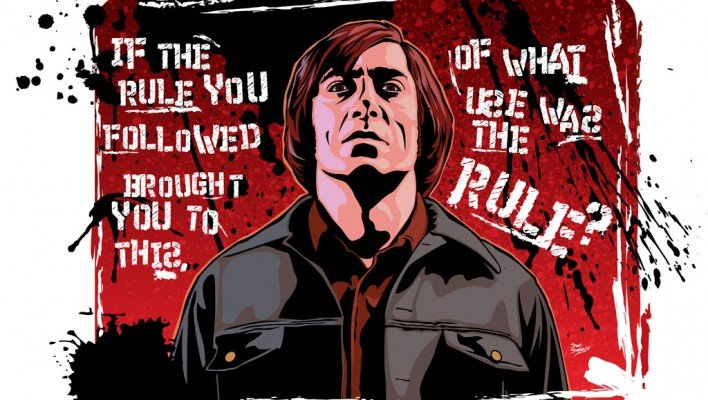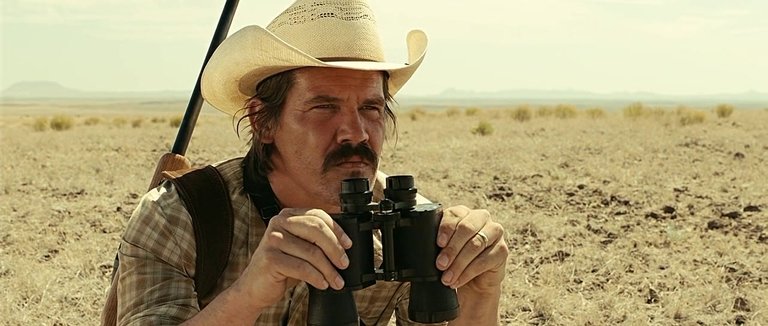
Anton Chigurh, the main antagonist in Cormac Mcarthy's "No Country for Old Men".
Order v.s. Chaos
[Disclaimer: Spoilers ahead. If you haven't seen No Country for Old Men, proceed at your own peril!]
In the Coen brothers' adaptation of the American Novel "No Country for Old Men", Anton Chigurh (Javier Bardem) is a menacingly, almost supernaturally indifferent hitman hired by a Mexican drug cartel to track down their lost bag of cash, which was stumbled upon and commandeered by Lewellyn Moss (Josh Brolin), a local Vietnam vet who, as luck would have it, had been out hunting in the area. The movie opens with a monologue by Sheriff Ed Tom Bell (Tommy Lee Jones), in which he laments about the "old timer" sheriffs who didn't even wear their guns. He also attempts to explain the circumstances around his arrest of a man who murdered a fourteen year old girl, but comes up short when he's recounting the killer's "reasoning"; the man said that he had been planning to kill somebody "for about as long as he could remember", and if he (the Sheriff) turned him loose, he'd do it again. The Sheriff ends his little soliloquy by explaining that he's not afraid of people like this man, but that he is simply unwilling to go out and "meet something that he doesn't understand".
What doesn't he understand? In my view, the Sheriff, who represents the forces of Law and Order, is unequipped and is quite simply overmatched by the individual he has been tasked with tracking down and bringing to justice, Mr. Anton Chigurh. Alternatively, Chigurh seems to be the physical embodiment of pure, unadulterated chance, governed only by his own devotion to Chaos. Throughout the movie, he seeks and destroys one adversary after another, including the clever and capable Lewellyn Moss (although he meets his final fate at the hands of the cartel), all while evading capture by the Sheriff with relative ease. His unflinchingly cold pursuit of the cash eventually proves to be too powerful for any of the story's characters to stop or impede.

During an iconic and self-defining sequence, Chigurh stops along the road at a gas station and engages in a dialogue with the clerk, a sleepy but pleasant old man who owns and operates the establishment. After speaking with him briefly about how he came into owning the gas station, Chigurh pulls a quarter out of his pocket and tells the man to "call it". Chigurh explains to the man that he has "everything" to gain from the toss, implying that he would die if he was to lose. Again, as luck would have it, the man wins the toss and Chigurh allows him to keep the coin, while advising him to keep it separate from the other change in his pocket. Chigurh keeps his word and leaves the station, allowing the man to die another day.
Human Resourcefulness

Josh Brolin's Lewellyn Moss.
Given that the forces of Order and Chaos are already represented in Mcarthy's story, I would contend that Moss embodies the ideal of human resourcefullness against the backdrop of every human being's ultimate fate: death. Despite his ultimate defeat at the hands of Chigurh, Moss does put up quite a fight, even managing to wound Chigurh in the leg during their first confrontation. For a few minutes there, the viewer even begins to believe that Moss could pull it off and escape with the money and his life intact. However, the Mexican cartel eventually kills Moss and recaptures the money during a moment of weakness in which he lets down his guard, as we all tend to do from time to time. It is here where Chaos reigns supreme; human resourcefulness will never be enough to stop the uncompromising laws of chaos and chance.
Conclusion
The concepts of Law, Order, and Resourcefulness have all been conceived in humanity's ultimate pursuit of survival. In this story, Chigurh's unremitting chaotic behavior clearly defeats both the Sheriff, who fails in his task to bring him in, and Moss, who is murdered while attempting to give him contest. At the movie's conclusion, wee see Chigurh calmly driving through a residential neighborhood, when he is abruptly broadsided by another motorist. Chigurh is seriously injured as a result of the accident, signaling to the audience that even Chigurh, whose very existence is rooted in the concept of chance, is not immune to the random, chaotic nature of reality. As the movie so cleverly puts it, "no one ever sees what's comin'".
The author of this article is an active New York City Police Officer, currently serving the City in an investigative capacity.
Cormac McCarthy's stories always hit me hard. They're so bleak, and happy endings are pretty much never guaranteed. I enjoyed this movie, but I have a hard time jumping into his other writing (and movie adaptations) because of how miserable/sad they are (Blood Meridian's ending really rubbed salt in my wounds - hear they're making a movie of that, too).
You can't argue that he's good at writing bad guys and flawed (human) characters, though, right?
Couldn't agree more. His characters, especially the bad guys, always seem to have such substance. In his stories, everything they do has double meaning. Obviously, this one is my fave, but I'd like to give Blood Meridian a read as well. Thanks for the comment!
Congratulations @ryanjk8! You have completed some achievement on Steemit and have been rewarded with new badge(s) :
Click on any badge to view your own Board of Honor on SteemitBoard.
For more information about SteemitBoard, click here
If you no longer want to receive notifications, reply to this comment with the word
STOP